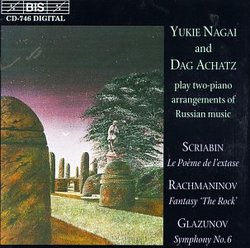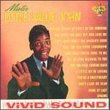| All Artists: Alexander Glazunov, Sergey Rachmaninov, Alexander Scriabin, Dag Achatz, Yukie Nagai Title: Alexandr Scriabin: Le Poème de l'extase; Sergey Rachmaninov: The Rock; Alexandr Glazunov: Symphony No. 6 Members Wishing: 1 Total Copies: 0 Label: Bis Release Date: 5/21/1996 Album Type: Import Genre: Classical Styles: Forms & Genres, Theatrical, Incidental & Program Music, Historical Periods, Modern, 20th, & 21st Century, Symphonies Number of Discs: 1 SwapaCD Credits: 1 UPC: 789368363728 |
Search - Alexander Glazunov, Sergey Rachmaninov, Alexander Scriabin :: Alexandr Scriabin: Le Poème de l'extase; Sergey Rachmaninov: The Rock; Alexandr Glazunov: Symphony No. 6
CD DetailsSimilar CDs
|
CD ReviewsRussian Rarities - Towering Performances Hexameron | 04/11/2007 (5 out of 5 stars) "The BIS label stands out for its superlative recording sound and focus on obscure composers and works. Moreover, the piano duo, Dag Achatz and Yukie Nagai are among the greatest piano duo team I've had the pleasure of hearing. Witness the magnificent achievement in their Tchaikovsky: Symphony No5, Op64; Swan Lake Op20 recording. Like the Prague Duo, Goldstone and Clemmow, and Matthies and Kohn, their technical superiority and musicianship are so far above what some might except from a mere "piano duo." This particular recording traverses three substantial Russian orchestral works arranged for two pianos. Over the span of these three very diverse and complex works, this piano duo plays with consistent sensitivity, musical feeling, and technical facility.
I'm not embarrassed about my fledgling status as a classical music listener, so I'll confess that I've never heard these works before. I may be at somewhat of a disadvantage, then, when it comes to reviewing this CD; I can't make comparisons between the orchestral and two-piano version. I do, however, have an affinity for piano compositions, and I've heard many piano duos and piano transcriptions. Therefore, I feel qualified enough to say that these two-piano transcriptions and their respective performances deserve wide acclaim. Transcribed by Rachmaninov, Glazunov's Symphony No. 6 is not a truly great one, yet there are plenty of intriguing and engaging ideas. I can understand how the first movement, a mellow but grand Adagio, induced Rachmaninov to transcribe it to the depths of the piano. Passionate moments, intense themes and beautiful modulations are just a few of the Adagio's wonderful characteristics. The second movement, a Theme and Variations is full of lyricism, grace, and some unexpected excitement. While the Intermezzo is not as memorable, its gaiety and Chopinesque figurations are attractive. Lastly, the Baroque-like spectacular Finale provides satisfying and majestic melodies. Through Rachmaninov's labors, this Symphony is pianistically convincing; if I were told this was a Piano Sonata for two pianos, I wouldn't know any better. The harmonies are crisp and the imitative polyphony clear: I have doubts whether the orchestral version could match the two-piano arrangement's incisive articulation. Rachmaninov's transcription of 'The Rock' is another successful one and I'm not surprised. Rachmaninov's Suites and Symphonic Dances don't need an orchestra to reach orchestral sonorities and neither does this transcription. Whether in the gentle intimacy of the opening or the swelling climax at the end, this work sounds crystalline, romantic and truly orchestral on two pianos. 'The Rock' itself is not considered a popular work but I think there are impressive effects and beautiful moments to be found here. The last work performed for two pianos is Scriabin's massive and mysterious Poem of Ecstasy. I realize I'm missing a crucial experience when I've never heard its orchestral rendition: harps, organs and important orchestration are obviously missing in the piano arrangement. However, Leon Conus did the best he can with this cloudy and dissonant monstrosity. This single-movement work is apparently in sonata form, but after listening to it over a dozen times I still cannot detect a development section or even a single theme; motivic ideas are all I am able to distinguish. I feel a little better after reading that Prokofiev couldn't follow the music either and got a headache while listening to it. Despite this, the music is incredibly powerful in its orgiastic, erotic and cerebral expressions. Almost devoid of a tonal center or predictable harmonic progressions, the music winds its way through a maze of ideas and constantly maintains a dreamy mood. For Scriabinites, I feel this two piano version is invaluable. There are no orchestral blurs or residual coloring, only pianistic clarity of a highly complex work, one which actually seems better suited to the piano. Comprehension of this work might be impossible. To my mind, however, the kaleidoscope of melodic lines and harmonies are more easily grasped because of the sharpness and dynamics of the piano. Bottom line: These three marvelous piano arrangements are successful because they showcase the intrinsic musical ideas and pianistic merits of each corresponding work exceptionally well. It seems both Rachmaninov and Conus understand the limitations and the orchestral powers of the piano. And once again, the piano duo, Achatz and Nagai, continue to demonstrate meticulous and emotional interpretations of every work they tackle." |


 Track Listings (6) - Disc #1
Track Listings (6) - Disc #1

